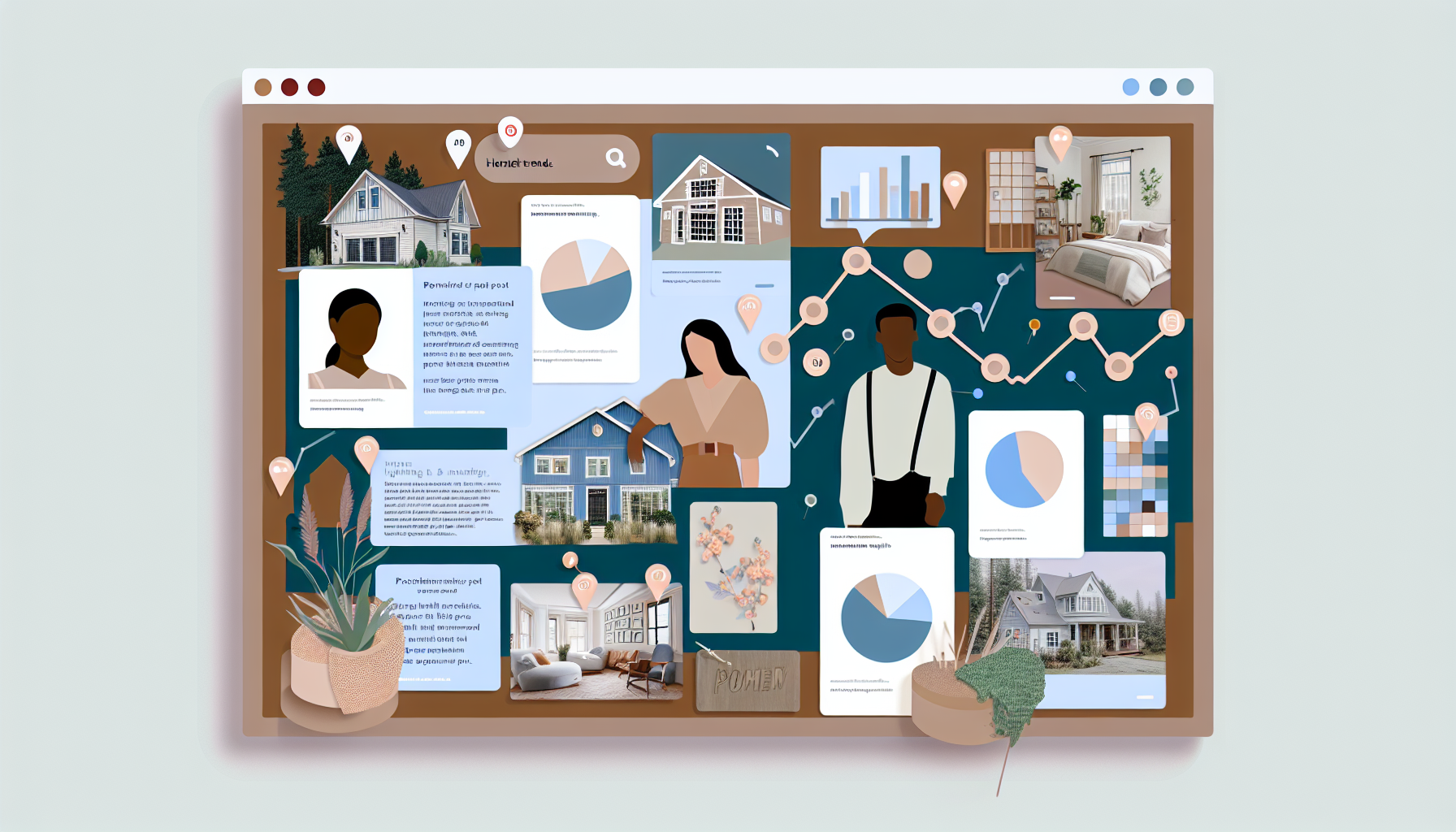Choosing the best social media for your real estate business entails understanding where your audience is and what content they engage with. In this guide, we straightforwardly evaluate the leading platforms, helping realtors like you pinpoint “which social media is the best choice for realtors” when it comes to promoting properties, building relationships, and boosting sales without overwhelming you with details.
Key Takeaways
Real estate agents should choose a social media platform that aligns with their target demographics, comfort with various content formats, and has the ability to extend marketing reach through targeted ads.
Facebook, Instagram, and LinkedIn are the primary social media platforms recommended for realtors to connect with their audience and optimize marketing impact effectively.
Realtors should employ consistent, valuable content delivery and active engagement with their audience to build trust and relationships, leveraging tools to streamline social media management and track performance.
Evaluating the Top Social Media Platforms for Realtors
The world is at your fingertips, quite literally. In today’s technologically advanced era, social media platforms provide real estate agents with the ability to target different demographics, build a network of prospects and leads, and distribute educational content to potential clients. But how do we navigate this vast social media landscape? The key lies in understanding the unique advantages and disadvantages of each platform.
Social media advertising simplifies the process of extending your marketing reach. It enables you to elevate posts to people outside your direct connections and execute targeted ads. Furthermore, sharing previous success stories and social proof on social media can build trust with strangers and further engage potential clients. However, one of the main challenges faced by real estate professionals in social media marketing is limited time to dedicate to social media activities. Therefore, selecting platforms that align with your strengths and comfort with various content formats, such as video, images, and text, is pivotal.
Facebook: The Leader in Real Estate Marketing
With its diverse ad targeting options and group features, Facebook stands tall as the leader in real estate marketing. Its user base primarily consists of adults between 25 and 54 years old, a demographic that lands squarely in the center of the home-buying age range. This broad audience reach makes Facebook a top choice for most realtors.
Advertising on Facebook allows realtors to connect effectively with this broad audience and leverage the platform’s detailed targeting features. As the saying goes, “Go where your clients are,” and in this digital era, they are on Facebook. Consequently, if your objective as a realtor is to amplify your real estate business, prioritizing Facebook is a wise decision.
Instagram: Visual Appeal for Luxury Properties

Do you have a luxury property listing that you’re eager to showcase? Instagram might be your go-to platform. Offering a canvas for high-quality images and videos, Instagram enables real estate businesses to captivate potential buyers in a visually appealing manner. It’s no surprise that younger demographics, such as millennials who are key first-time homebuyers, are drawn to visual content when considering properties.
From showcasing dream houses to providing a unique view of listings through Instagram Stories and Reels, Instagram serves as an effective tool for realtors to share personal and behind-the-scenes content. By utilizing relevant hashtags, you can extend your reach and increase visibility for your property listings. With 46% of users between the ages of 25 and 44, Instagram is a platform where real estate agents can connect with a large, younger audience.
Consequently, if your marketing strategy targets younger demographics, Instagram could be the perfect platform for your real estate business.
LinkedIn: Building Professional Connections
LinkedIn is not just for job seekers and recruiters – it’s a goldmine for real estate agents too! As a real estate agent, it offers a platform to network with professionals, share industry news, and target high-earning individuals, contributing to lead generation efforts for real estate clients. Its user base primarily includes educated professionals with higher net worth, which benefits agents focusing on financially stable and investment-ready audiences in the real estate industry.
To grow an organic following on LinkedIn, successful agents typically leverage an already established sphere of influence. Engaging in real estate-related LinkedIn groups can boost a realtor’s credibility and significantly extend their networking reach.
As a realtor seeking to cultivate professional relationships and position yourself as an industry authority, LinkedIn is a suitable platform for you!
YouTube: Engaging Video Content

In the age of digital media, videos have emerged as a powerful tool for marketing. They allow for a dynamic and engaging way of showcasing real estate properties. YouTube offers real estate agents access to over 2.7 billion monthly users and makes it easy to enhance their online presence through a well-optimized YouTube channel.
YouTube’s video format increases inquiries for real estate listings in the following ways:
Agents can showcase property tours and market insights in an engaging video format
Videos on YouTube can benefit website rankings
Testimonials and success stories shared on YouTube can significantly enhance a realtor’s credibility, conveying their effectiveness and client satisfaction.
Thus, if you thrive in front of a camera, YouTube might be your stepping stone to success in real estate marketing.
Pinterest: Showcasing Expertise and Inspiration

Pinterest, a platform known for its visually appealing medium, offers realtors a unique opportunity to exhibit their property listings. If you have a knack for photography, Pinterest could be your canvas to showcase properties and aesthetic details, demonstrating your expertise.
Attracting traffic through Pinterest can be achieved by strategically pinning content that highlights property listings. With its visually appealing interface and user-friendly design, Pinterest can be an excellent platform for realtors to connect with potential clients who love visual content.
TikTok: Connecting with Future Homebuyers
The rise of TikTok has created a new wave in social media marketing. By creating authentic, engaging short-form videos on TikTok, realtors can resonate more effectively with future homebuyers. If your target audience includes younger homebuyers, TikTok might be a suitable platform for your real estate marketing.
Types of content that do well on TikTok include:
Home tours
Day-in-the-life micro-vlogs
Realtor life humor
Home renovation content
TikTok offers a unique opportunity for realtors to share real estate tips and insights in a format that appeals to a newer generation of homebuyers. Therefore, if you’re a realtor with a penchant for experimentation and engaging younger audiences, TikTok might be an appealing platform for you!
Twitter: Establishing Industry Expertise
If you’re a realtor who loves to write and share insights, Twitter might be your platform. By posting real estate news and articles, you can position yourself as a knowledgeable industry figure. Establishing thought leadership on Twitter can be accomplished by engaging with followers through responses to comments, questions, direct messages, and participation in industry conversations.
By using Twitter, you can:
Share information about local events or news
Establish yourself as a local expert
Offer value to followers and the larger community
Monitor brand mentions, industry developments, and competitor activities
Stay current with market sentiment through social listening and sentiment analysis on Twitter.
Therefore, if you’re a realtor possessing strong writing skills and a propensity for participating in industry dialogues, Twitter might be your preferred platform.
Finding Your Niche: How to Choose the Right Platform(s) for Your Real Estate Business
Choosing the right social media platforms for your real estate business can feel like finding a needle in a haystack. However, it doesn’t have to be that complicated. Realtors primarily use social media to:
Expand their professional network
Build connections
Share valuable content
Engage with potential clients
The main focus is on building connections rather than directly selling properties.
Although it may be tempting to jump onto every platform, it’s typically recommended to start with Facebook, Instagram, and LinkedIn. Focusing on two to three social media sites for your marketing helps maintain manageability and impact.
Identifying Your Target Audience

Understanding your target audience is key to your marketing efforts. To define your target audience in real estate, you need to identify their demographics, which include age, gender, income, education level, and location. But it doesn’t stop there. Understanding the psychographics of your target audience, such as interests, values, attitudes, and behavior is also crucial for tailored marketing.
In addition, it’s important to identify the pain points that your target audience faces when buying or selling real estate. This allows you to create marketing messages that resonate with them and address their specific needs. A detailed buyer persona should be developed, encompassing demographics, psychographics, and pain points to guide your marketing strategies.
Aligning Your Marketing Goals with Platform Features
Aligning your marketing goals with the features of your chosen social media platforms is essential for effective marketing. Facebook’s age, demographic, interest, and location targeting options, for instance, can help you reach specific buyer personas. With Facebook’s Lookalike Audience feature, you can extend your reach to new prospects who possess similar characteristics to your existing clientele, leading to better conversion rates.
It’s pivotal to select platforms that resonate with your content style and where your target demographic is most actively engaged. Assessing each platform’s advertising capabilities, targeting options, and analytic tools can help you tailor and track the success of your real estate marketing campaigns. By incorporating high-quality images and videos into LinkedIn ads, for instance, you can captivate potential clients, effectively showcasing real estate properties and neighborhood amenities.
Assessing Your Personal Strengths and Preferences
Now that you understand your target audience and the features of different platforms, it’s time to assess your personal strengths and preferences. Agents should assess their own communication style, choosing platforms that allow for a natural engagement with their audience, whether casual or professional. If you’re more comfortable with formal business communications, LinkedIn might be your platform of choice. On the other hand, if you’re more into casual, visually appealing content, you might find Instagram or Pinterest more suitable.
Maintaining a consistent brand voice and aesthetic across all chosen social media platforms is essential for agents to be recognizable and memorable to their audience. Whether it’s the visuals you use, the tone of your content, or the topics you talk about, consistency is key. By aligning your personal strengths and preferences with your chosen platforms, you can create an authentic and compelling social media presence.
Best Practices for Social Media Success in Real Estate
Having discussed the significance of choosing appropriate social media platforms and comprehending your audience, let’s explore the best practices for achieving success in real estate social media as part of a real estate marketing strategy. To be successful on social media platforms, real estate marketers should be consistent, deliver valuable content, and engage in networking and collaboration.
Brand management and compliance features within social media tools ensure that your marketing efforts are consistent and protect the online reputation of your brand.
Consistency is Key
Consistency is more than just regularly posting on your social media platforms. It’s about developing a dialogue, sharing expertise, and building ongoing relationships with clients, which are critical elements for establishing trust. A regular online presence can lead to enhanced engagement across various stages of the property buying process and initiate conversations with prospective clients.
Regular and consistent posting on Instagram, for instance, is necessary for realtors to stay top of mind with their audience, maximizing engagement and relevance. Whether it involves posting property listings, disseminating industry news, or interacting with your audience, maintaining consistency is paramount.
Delivering Value Through Content

Delivering valuable content is essential for any successful social media strategy. By utilizing Instagram’s reels and stories and creating YouTube videos like property walk-throughs and neighborhood tours, you can effectively showcase properties to potential clients. Including calls to action in YouTube videos and providing informative content about the pros and cons of neighborhoods can engage and qualify potential clients.
By expressing your unique personal brand and letting your personality shine through social media, you can forge a more personal connection with consumers, enhancing your success on social platforms. Whether it’s a blog post, video, or infographic, ensure your content is engaging, enlightening, and valuable to your audience.
Networking and Collaboration

Building a robust network is vital for any realtor. Inviting previous buyers and sellers to be part of your social media communities contributes to a robust network of trustworthy voices and potential referrals. Participation in real estate-related groups and communities enables you to network with peers, exchange valuable insights, and grow your professional circles.
Collaborating with local businesses and industry professionals on social media can open the door to mutually beneficial relationships and help to attract a broader client base. Networking on social media extends your reach beyond personal contacts, enhancing market visibility and brand recognition. Ensure active engagement with your audience, quick responses to comments and messages, and building connections with city or neighborhood accounts on platforms like Twitter to increase the visibility of your property listings and improve exposure.
For more on successful networking strategies, see our blog post: https://www.quickcommissionadvance.com/blog/unlocking-success-through-real-estate-networking-strategies-and-tips-for-professionals/
Tools to Streamline Your Social Media Efforts
In an industry as fast-paced as real estate, saving time and improving efficiency is crucial. That’s where social media tools come in. Social media management tools like Hootsuite, Buffer, and Sprout Social can help you manage your online presence effectively.
These tools often include mobile app support, which is essential for realtors who work remotely and while on the move.
Scheduling and Management Platforms
Scheduling and management platforms can be a game-changer for your social media strategy. These platforms enable you to schedule posts, analyze content across multiple platforms, and offer content creation and monitoring tools. For instance, Hootsuite can schedule, publish, and analyze content across Facebook and Instagram. Sprout Social features a Smart Inbox and analytics tools and is an affordable option for an individual user. Buffer offers a simple, intuitive platform with publishing capabilities across major networks and a vital statistics dashboard.
Whether you’re working independently or as part of a team, these social media accounts can facilitate your endeavors on various platforms.
Visual Content Creation Tools
Visual content is a powerful tool to engage your audience. Some tools that can help you create stunning visual content are:
Pixlr
Adobe Express
Canva
InVideo
Animoto
These tools offer user-friendly image and template editing, catering to the needs of real estate professionals with a wide range of design options. InVideo and Animoto are easy-to-use video editing software with real estate-focused templates that can help agents generate leads with notable content.
If you’re a realtor aiming to enhance your online presence with professionally crafted graphics and media, it’s worth considering these visual content creation tools.
Analytics and Performance Tracking
Analytics and performance tracking tools are crucial for measuring social media marketing success. By leveraging analytics, you can:
Pinpoint the optimal times for posting content
Assess campaign effectiveness
Prove ROI
Use real-time data to optimize marketing campaigns for improved performance.
Whether your goal is to monitor website traffic, conversion rates, or make informed decisions based on data, analytics and performance tracking tools can assist in achieving these objectives.
Summary
In conclusion, social media platforms offer a plethora of opportunities for real estate agents. Whether it’s Facebook with its broad user base, Instagram’s visual appeal, LinkedIn’s professional network, YouTube’s engaging video content, Pinterest’s showcasing expertise, TikTok’s connection with younger homebuyers, or Twitter’s platform for establishing industry expertise – each platform offers unique advantages. By understanding your target audience, aligning your marketing goals with platform features, and assessing your personal strengths and preferences, you can choose the right platforms for your real estate business. Remember, consistency, delivering valuable content, and networking and collaboration are key to social media success. Leverage social media tools to streamline your efforts and track performance. Here’s to your success in the world of social media marketing for real estate!
Frequently Asked Questions

Should realtors have separate social media accounts?
Yes, realtors should consider having separate social media accounts to maintain a professional image while also sharing personal aspects of their lives. This approach allows for a balance between personal expression and a polished business presence.
What is the best platform for real estate marketing?
The best platform for real estate marketing is Wix, which offers tools to design and create effective campaigns. Consider using Wix Editor X Design for your marketing needs.
What is the most popular social media for realtors?
The most popular social media platforms for realtors are Instagram, Facebook, YouTube, Snapchat, and Twitter. Consider using these platforms to connect with potential clients and showcase your real estate listings. Happy networking!
Why is consistency important in social media marketing?
Consistency in social media marketing is important because it helps in establishing trust with clients through ongoing relationships and sharing expertise. It is key to developing a successful dialogue.
How can I deliver value through content in my real estate marketing?
Deliver value through your real estate marketing by showcasing properties with high-quality visuals, offering neighborhood insights, and developing your personal brand. This will engage and attract potential clients.

Leave a Reply